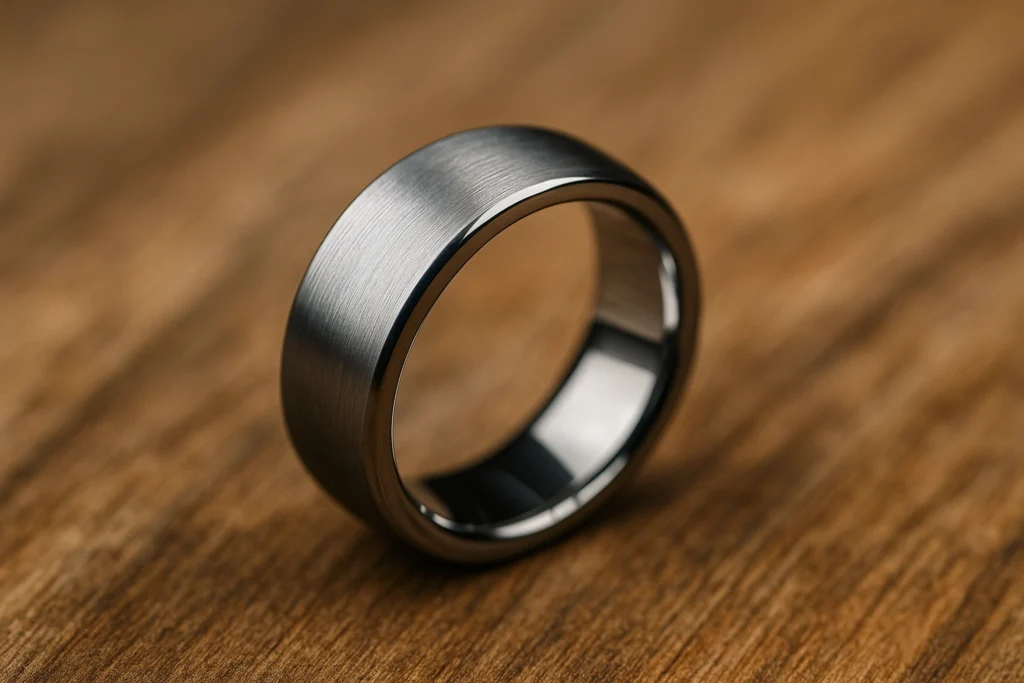If you’ve ever worn a tungsten ring or seen tungsten used in heavy machinery, you might have wondered — does tungsten rust like other metals? Here’s the thing, most people assume every metal rusts when it gets wet or old. But tungsten plays by different rules. It’s one of the most durable and stable metals on Earth, and its behavior against rust is actually fascinating.
So, grab your coffee, because we’re diving into the real story behind tungsten, its reaction to air and water, and what happens when it faces extreme conditions. Whether you’re just curious or considering a tungsten wedding ring, this guide will tell you everything you need to know.
Snippet-Ready Definition:
Tungsten doesn’t rust because it isn’t iron-based. It’s a highly durable, corrosion-resistant metal that stays shiny in air and water, though it may slightly oxidize at very high heat.
What Rust Really Means and Why It Doesn’t Apply to Tungsten
Let’s start with a simple truth: rust only happens to iron-based metals. Rust is a form of iron oxide that appears when iron reacts with oxygen and moisture. Think of old fences, bikes, or nails that turn reddish-brown over time — that’s rust.
Now here’s where tungsten stands out. It’s not an iron-based metal. That means it can’t technically “rust.” Instead, it can only oxidize, and even that happens under very extreme conditions. Tungsten atoms are tightly packed and chemically stable, so air and moisture just can’t mess with it the same way they do with iron.
In short:
- Rust = specific to iron and steel
- Tungsten = non-ferrous, doesn’t rust
- At room temperature, tungsten stays clean, shiny, and stable for years
So the next time someone says “tungsten doesn’t rust,” they’re absolutely right — but it’s more accurate to say it “doesn’t oxidize easily.”
Understanding Tungsten: Strong, Stable, and Surprisingly Complex
Tungsten is one of those metals that doesn’t just look tough — it truly is. It has the highest melting point of any metal (around 3,422°C) and incredible density. That’s why it’s used in things like airplane turbines, armor-piercing projectiles, and yes, jewelry.
Its structure gives it amazing stability. Even when exposed to air, tungsten stays calm and doesn’t react. It doesn’t flake, bubble, or develop that dull brown coat like iron does. This natural resistance makes tungsten ideal for long-term use.
In the jewelry world, tungsten’s strength is a big plus. A tungsten ring, for example, doesn’t lose its shine easily. You can wear it in the shower, in the rain, or while washing dishes — it won’t rust. That’s why it’s often called a “forever metal.”
So, Does Pure Tungsten Rust or Oxidize?
Here’s the straight answer: pure tungsten doesn’t rust. Under normal conditions — think everyday air, humidity, or tap water — it remains unaffected. You can leave a piece of tungsten on your counter for years, and it’ll look exactly the same.
But, if you expose tungsten to extreme heat, around 600°C or higher, things change. At that temperature, tungsten starts to react with oxygen and forms a thin oxide layer, known as tungsten trioxide (WO₃). It’s not rust, but a form of oxidation that happens only under very hot conditions.
If you’ve ever seen tungsten components used in light bulbs or heating elements, you might have noticed they darken after long use. That’s the oxide layer forming due to high heat, not rust.
To sum up:
- In normal air and water: no rust, no damage
- In extreme heat: light oxidation
- In everyday life: 100% safe and stable
When Tungsten Might Corrode
Even though pure tungsten is practically invincible under normal conditions, some tungsten products aren’t entirely pure. That’s where things get interesting.
Industrial tungsten alloys, like those used in tools or electronics, often contain binders such as cobalt or nickel. These binders can corrode or rust over time, especially when exposed to saltwater or chemicals.
Here’s what can cause trouble:
- Extreme heat: prolonged exposure causes oxidation
- Saltwater environments: electrolytic reactions may corrode alloy binders
- Strong acids or chemicals: long-term contact can weaken or discolor tungsten components
- Scratches and dents: these can expose small areas of binder metal, increasing corrosion risk
So yes, tungsten itself is incredibly strong, but when it’s mixed with other metals, those weaker parts might corrode.
Tungsten Alloys and Tungsten Carbide: The Real Story
Most tungsten jewelry and industrial tools are actually tungsten carbide, not pure tungsten. Tungsten carbide is a combination of tungsten and carbon, often bonded with cobalt or nickel.
Now, does tungsten carbide rust? Technically, the tungsten carbide part doesn’t, but the cobalt binder can corrode when exposed to moisture or saltwater. That’s why sometimes, after years of heavy use, tungsten carbide tools show slight discoloration or surface spots.
To prevent this:
- Choose nickel-bonded tungsten carbide instead of cobalt-bonded (nickel resists corrosion better).
- Keep tungsten carbide tools clean and dry after use.
- Avoid storing them in humid or salty environments.
In short, it’s not the tungsten or the carbon that rusts — it’s the binder that holds them together. Pick the right grade, and your tungsten product will last nearly forever.
Tungsten Jewelry: Real-Life Wear and Tear
Tungsten rings have become super popular in the last decade, especially for men’s wedding bands. Why? Because they’re stylish, affordable, and practically indestructible.
But people often ask, “Will my tungsten ring rust, tarnish, or turn my finger green?” Let’s clear that up.
- Rust: No, it won’t rust. Tungsten is non-ferrous and waterproof.
- Tarnish: Tungsten doesn’t tarnish like silver does. It might lose a bit of shine over time but can easily be polished.
- Finger turning green: This only happens with rings containing cobalt. If your ring is made with nickel-bonded tungsten, it’s completely safe and hypoallergenic.
Here’s a tip: if you’re buying a tungsten ring, ask your jeweler whether it’s cobalt or nickel bonded. Nickel versions are always the better choice for sensitive skin and long-term shine.
And don’t worry about getting it wet — it’s perfectly fine to wash your hands or wear your ring in the rain. Just avoid chlorinated pools or harsh chemicals, as they can dull the polish.
Does Tungsten Conduct Electricity or Corrode Electrically?
Yes, tungsten is an excellent conductor of electricity. That’s why it’s used in light bulb filaments and electronic components. But electrical conductivity doesn’t mean it’ll corrode easily. In fact, tungsten’s ability to carry current without breaking down is one reason it’s so valuable in engineering.
Electrochemical corrosion can occur in alloys that contain cobalt when exposed to saltwater or acidic solutions. That’s more of a problem for industrial applications than jewelry. Still, it’s good to know tungsten handles electricity safely without degrading, especially in dry or neutral environments.
How Tungsten Reacts with the Environment
Tungsten’s natural stability makes it practically immune to normal weather. You can wear tungsten jewelry in humid conditions, leave it in your bathroom, or take it through temperature changes — it’ll stay the same.
Here’s a quick breakdown:
- In air: No reaction at room temperature
- In water: Totally stable
- In saltwater: Possible binder corrosion in carbide alloys
- At high heat: Oxidation above 600°C
- In acids or bases: Resistant to most, except very strong ones
So unless you’re planning to dip your tungsten ring in acid or melt it in a furnace, it’s not going anywhere.
Comparing Tungsten with Other Metals
Let’s compare tungsten with some common metals you might know:
| Metal | Can It Rust? | Reaction Type | Durability |
| Tungsten | No | Oxidizes at very high heat | Extremely durable |
| Titanium | No | Forms protective oxide layer | Highly durable |
| Steel | Yes | Rusts easily | Needs maintenance |
| Stainless Steel | Rarely | Chromium oxide protects it | Very durable |
So if you’re thinking of a rustproof metal for your ring, tungsten and titanium both win. But tungsten has a denser, more luxurious feel, which is why many jewelers love working with it.
Expert Insights and Research
Researchers have studied tungsten’s oxidation for decades. Studies show that tungsten oxidation begins around 600–800°C — far beyond any temperature your jewelry or tools will ever reach. Even in laboratory conditions, it takes intense heat and pressure to form visible oxidation.
In one study on tungsten carbide used in marine environments, corrosion was linked to cobalt binders reacting with saltwater ions — not the tungsten itself. This backs up what jewelers and engineers already know: pure tungsten doesn’t rust, but alloys can corrode slightly if poorly bonded.
That’s why top manufacturers and jewelers now use nickel-based tungsten for better longevity and skin safety.
How to Protect Tungsten from Corrosion or Oxidation
Tungsten doesn’t need much care, but a little effort goes a long way.
For jewelry:
- Clean it with mild soap and water, then dry with a soft cloth.
- Avoid prolonged contact with chlorine, bleach, or saltwater.
- Store in a dry jewelry box when not wearing it.
For industrial or tool use:
- Keep tools clean and free from metal dust.
- Apply a thin protective oil layer if used near saltwater.
- Inspect for any visible cracks or corrosion on binders.
The best part is, tungsten rarely needs polishing or re-plating. Once you buy a good-quality piece, it stays that way for years.
Comparison Table: Tungsten vs Other Metals
| Metal | Can It Rust? | Reaction Type | Durability | Best Use |
| Tungsten | ❌ No | Oxidizes only at high heat | Extremely high | Jewelry, tools, electronics |
| Steel | ✅ Yes | Rusts easily | Moderate | Construction, machinery |
| Stainless Steel | ⚪ Rarely | Forms protective oxide | High | Cookware, medical tools |
| Titanium | ❌ No | Forms oxide layer | Very high | Aerospace, jewelry |
| Silver | ⚪ Tarnishes | Sulfide reaction | Moderate | Jewelry |
| Gold | ❌ No | Non-reactive | Very high | Luxury jewelry |
Quick Bullet List: How to Keep Tungsten Shiny
- Clean gently with mild soap and warm water.
- Dry with a soft microfiber cloth.
- Avoid long exposure to saltwater or chlorine.
- Store in a dry box to prevent scratches.
- Use a jewelry polish cloth once every few months for best shine.
Myths and Misconceptions About Tungsten Rust
Let’s bust a few common myths.
Myth 1: Tungsten rusts like iron.
Nope. Tungsten doesn’t rust because it doesn’t contain iron.
Myth 2: All tungsten rings are the same.
Not true. Some are cobalt-based, others are nickel-based. The latter is better for corrosion resistance and comfort.
Myth 3: If tungsten tarnishes, it’s rusting.
No — tarnish is just surface dullness, not rust. A quick polish brings back the shine.
Myth 4: Tungsten can’t break.
Actually, tungsten is very hard but brittle. It can shatter if dropped from a height onto a hard surface.
So remember, toughness doesn’t mean unbreakable — it means resistant to wear, scratches, and corrosion.
Quick FAQ
Does tungsten rust in water?
No. Pure tungsten and jewelry-grade tungsten are waterproof.
Does tungsten carbide rust?
Only if it has cobalt binder that corrodes over time.
Can tungsten rings rust in saltwater?
Rarely, but avoid long exposure for best shine.
Does tungsten turn your finger green?
Only cobalt-bonded rings might. Nickel-bonded ones won’t.
Does tungsten oxidize in air?
Only at very high heat levels.
Does tungsten tarnish?
Not really — it just might lose some polish after years of wear.
Conclusion
So, does tungsten rust? The clear answer is no. Tungsten doesn’t rust because it’s not iron-based. It’s one of the most corrosion-resistant and waterproof metals around. You can wear it daily, use it in industrial tools, or expose it to moisture — it’ll stay strong and spotless.
The only time tungsten shows change is under extreme heat or when mixed with other metals that can corrode. Choose nickel-bonded tungsten, keep it clean, and it’ll last a lifetime without a trace of rust.
Here’s the takeaway — whether you’re an engineer, a craftsman, or just someone shopping for a durable ring, tungsten is one of the best choices out there. It’s reliable, low-maintenance, and built to shine for decades.

Hi, I’m Bilal, the founder of outofmagazine.com. I love sharing fresh ideas, stories, and helpful insights on all kinds of topics that spark curiosity. My goal with this site is simple—to create a space where readers can find inspiration, useful tips, and engaging reads on lifestyle, trends, and everything in between.



